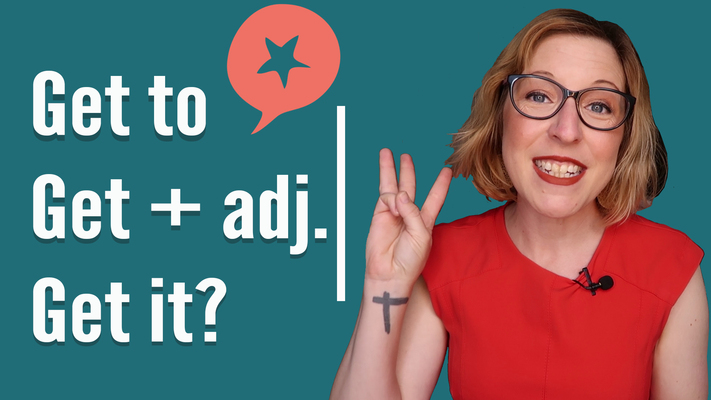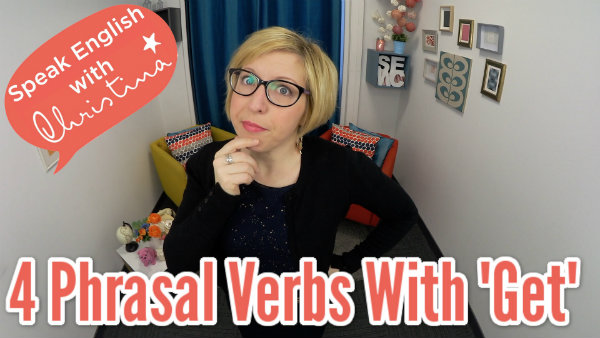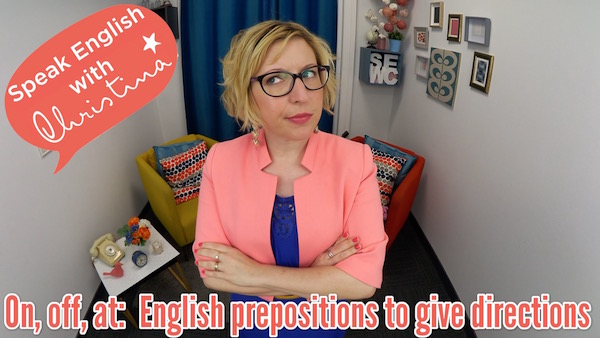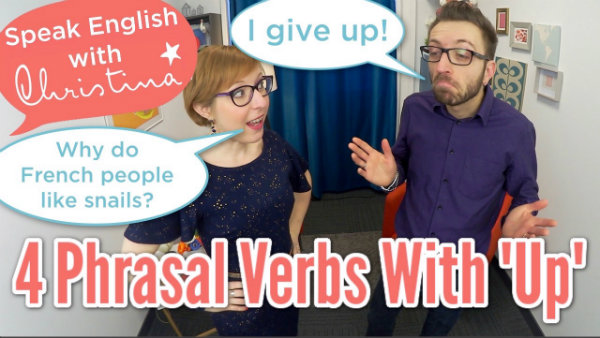
When you’re learning English, you can always find a way to say what you want, but it can be very long and awkward.
For example, instead of:
→ “I love my job, because I’m happy about the opportunity to work with people from all around the world.”
You can use:
→ “I love my job, because I get to work with people from all over the world.”
The first sentence is perfectly correct – but the second one is much shorter, and sounds much more natural. It will sound better in any English conversation you might have, for example in the Faster Fluency Conversation Club.
Sound more fluent in English: start using “get to” (= to have the chance of).
Index:
1) “Get to”: avoid complex sentences
2) “Get to” + verb = “to have the opportunity”
3) “Get to” and other uses of “get”: get fluent!
4) “Get to”: Recap to Remember
1) “Get to”: Avoid long complex sentences
When you’re speaking English in the business world, you often need to share some complex ideas. Such as:
→ Having the opportunity to do something / having the chance to do something
For example:
- “You will have the opportunity to work with people from all over the world.”
- “Tonight, I’ll have the chance to meet a big potential client”
- “People who register for the event in advance have the possibility to have a discount on the registration fees.”
To share these same ideas, you probably have your own structure that you feel comfortable using, and that you are used to using.
The problem is when you hear yourself, you know something is not quite as natural as advanced or native speakers. You know people understand you, but it doesn’t quite feel “right.”
Is there a simple, natural, more advanced way to say the same thing?
2) “Get to” (+ verb) = To have the opportunity
You can say “to have the opportunity” with a simple:
→ Get to (+verb) (= have the opportunity to / have the chance to)
For example, instead of the long sentences earlier, you can say instead:
- “You’ll get to work with people from all over the world.”
- “Tonight, I’ll get to meet a big potential client”
- “People who register for the event in advance get to have a discount on the registration fees.”
Now you can use it in your professional life! It’s shorter, and more simple for you.
And there’s more..
3) “Get to” and other uses of “get”: get fluent!
Many words in English language can have different meanings in English. For example, the prepositions of places (on, off, at) can mean a lot of different things – just check out the lesson about 4 Phrasal Verbs with “Up”!
Well, the English word “Get” has a lot of different meanings in English too. The Oxford English Dictionary gives the word “Get” more than 250 different definitions!
“Get” is used everywhere, for a lot of different situations. Let’s a couple of other meanings for “Get” :
→ “Get” = Understand
Sometimes, “Get” means “understand.” You “get” something when the idea clicks inside your head, everything falls into place and it finally makes sense. It’s close (but different) with the phrasal verb “figure out.”
For example:
- “I’m sorry, you’re explaining the concept but I still don’t get it.” = “I still don’t understand”.
- “I finally get it!” = “I finally understand!”
- “Did you get the joke?” = “Did you understand the joke?”
*** The extra mile: “Get it?” ***
A common abbreviation for:
- “Do you understand what I’m explaining?”
- “Did you understand the joke?”
- “Do you understand what I told you so far?”…
→ …is a simple sentence: “Get it?”
***
→ “Get” + adjective = Become
“Get” also means “become” when it comes before an adjective.
For example:
- “This is getting harder.” = “This is becoming more difficult.”
- “I get sleepy in the afternoon.” = “I become sleepy in the afternoon.”
Or even better:
“You’ll get more confident speaking English with my Faster Fluency Conversation Club!”
→ “From the get-go” = From the start, from the beginning, immediately
“From the get-go” is another English chunk (very short expression) with “get,” that you can use in some professional situations. It’s a useful expression, like Let’s Touch Base or other idioms in American English.
For example:
“When you use “get” instead of another verb, you sound more fluent and more natural from the get-go.”
Using “get” is an effective way to show people you speak real English, and that you’re confident about it.
By using “get to” instead of a longer sentence, you sound more American and it’s simpler for you, now that you know these common uses of the word “get”.
4) “Get to” – Recap to Remember:
Get to + verb: To have the opportunity, or the chance
→ You get to work with people from all over the world.
Get (in some situations): To understand
→ Did you get the joke? Get it?
Get + adjective: To become
→ You’ll get more confident speaking English, in my Faster Fluency Conversation Club.
From the get-go: From the beginning, immediately
→ You’ll get to practice effectively from the get-go.
And you can learn more in my previous lessons: 4 Phrasal Verbs with “Get”
Now, you’re one step closer to speaking real English more fluently and confidently.
You know, the verb “get” is a great way to start learning even more real-world English, for both your professional and personal life. It’s the kind of useful shortcuts you’ll learn when you practice English with the Faster Fluency Conversation Club.
And if you want to continue learning with me, I made a short playlist to help you continue moving from intermediate to advanced English. You’ll get my best tips to stop translating in your head and speak more fluidly, secrets to understand fast-talking Americans, and more.
See you in the next episode!
More good stuff...
Click the image to learn more








I’ve been trying to use « get » for some time now.
I thought it would help me think in English.
I initially replaced some verbs by get.
Easy with « become » before an adjective
Easy as well with « understand and receive » before nouns
More difficult with arrive , buy, obtain, bring, to be ( past)
What’s more, it was easy to use get with phrasal verbs ( up, along with, into, out , around, together)
To day I learned a new one : get to + verb
Every day, when I speak to myself , it’s kind of joke I get to use them